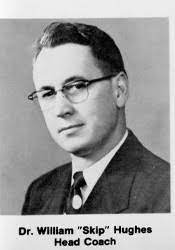Sometimes a coach has a team that is loaded with talent and sometimes a star player can lead his team to victory despite not being on the same page as his coach…but when the coach and the star player create a special bond then special things can happen. Dr. William “Skip” Hughes played basketball at Pitt and was later named head coach at St. Francis College in Loretto, PA. He spent more than 2 decades on the sideline and won almost 300 games but his teams from the early 1950s are the ones that had the most success: with star player Maurice Stokes leading the way they made it all the way to the NIT semifinals in 1955. Coach Hughes passed away in 1991 but HoopsHD’s Jon Teitel got to chat with former St. Francis SID Bob Moore about Skip’s life/legacy. Today marks the 26th anniversary of Skip’s induction into the school’s Athletics Hall of Fame on November 16, 1996, so we take this time to remember his remarkable career.
Hughes began his basketball career at Pitt where he was a 2-time captain: what made him choose Pitt, and how good a player was he back in the day? He was a very good player for Coach Doc Carlson. Later on when he became a coach he would occasionally put on a jersey and take the court with his players. He was a great athlete who eventually became a scratch golfer.
He later became coach at St. Francis: why did he take the job? He only lived about 30 minutes away. I think it is safe to say that St. Francis would never have become a D-1 school if Skip had not been there. There were rumors that he did not even receive a salary during his 1st few years!
While serving as coach he was also a full-time dentist: how was he able to balance the 2 gigs simultaneously? It was pretty difficult to drive up a mountain in the snow but he was a dentist by day and a coach by night. His players said that the night practices actually prepared them well for night games. He was a great recruiter: there was nobody who was his equal at that time because there was not a lot of competition around there.
His most famous recruit was Maurice Stokes from Westinghouse High School in Pittsburgh (who became 1 of the 1st African-American athletes in school history): how was he able to convince Stokes to come to St. Francis, and how big a deal was it back then to have a biracial team? It was a big deal. He cast a blind eye toward racial issues because he just wanted to win games. Stokes had a good friend/high school teammate named Eugene Phelps who had been recruited by Skip so that helped Stokes follow suit. The school did not have a lot of Black students but after a couple of 20-win seasons he was glad that he stuck around. He is buried on campus, which is proof of what he thought about the place. A lot of the students were vets from WWII so to make the NIT meant as much to the team as beating their local rival (Duquesne).
He stuck with his starting 5 most of the time and would only put in a substitute if a starter got in foul trouble: how exhausted were his starters by the end of the season? He ran them so hard during practice that they were “built for the night.” There was some grumbling by the bench players who did not get into the game much and during the 1960s that system did not work well for him.
In 1952 he lost to Marquette in the National Catholic Invitational title game: what was the feeling like in the locker room afterward? For Catholic schools in the East in the 1950s it was a big deal. However, that loss to Marquette propelled them very far the following season.
In the 1955 NIT tourney MVP Stokes scored a career-high 43 PTS/15-17 FT despite playing with a sprained ankle in a 6-PT OT loss to eventual runner-up Dayton after the Flyers made a desperation shot in the final seconds of regulation: where does that rank among the most devastating losses of his career? I do not think that it was a devastating loss: I think the 5-PT OT loss to Cincinnati in the 3rd-place game was the more harmful one. Stokes got a lot of accolades from that run and is still viewed as 1 of the best players in the history of the NIT. Beating Duquesne (who won the 1955 NIT) was important because they had always lost to them and they were a power back then.
When people look back on his career, how do you think that he should be remembered the most? I think he should be remembered as 1 of the finest recruiters of his era. He was able to attract a high quality of players while not getting compensated as much as other coaches…and he did all of this while having another profession at the same time! He even got players from Chicago, which was almost unthinkable back then. After retiring as a coach the school still used him to recruit, and he had a lot of guys who got drafted even when there were not as many college basketball programs back then.



